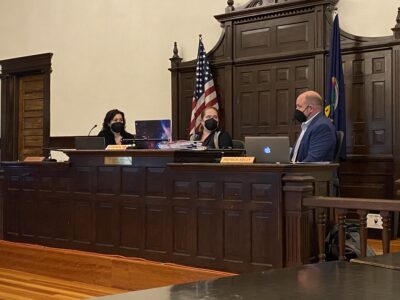Douglas County leaders make solar farm regulations official; commissioners also discuss free speech rights at public meetings

photo by: Austin Hornbostel/Journal-World
Douglas County commissioners talk about free speech rights and how they relate to limitations on what members of the public can say during public comment periods near the end of their Wednesday, May 4, 2022 meeting. Earlier that evening, one commenter — Michael Eravi with Lawrence Accountability — said he felt the commission was infringing on the public's right to free speech by muting microphones or removing people from meetings for using profanity.
Following a vote of approval from the Douglas County Commission on Wednesday night, regulations for possible future solar farms in the county are now official.
As the Journal-World previously reported, those regulations set specific limits for elements like the maximum size of a solar farm — 1,000 acres — and how far they must be set back from roads, homes and other structures. With the commission’s approval, solar energy firms and others wishing to develop solar farms here will be able to file applications for conditional use permits.
Though more than 20 members of the public offered comments to the commission the last time solar regulations were on an agenda at their April 20 meeting, only one person commented on the topic at Wednesday’s meeting: Scott Thellman, a farmer who lives in North Lawrence and provided his comments via Zoom. Thellman said he’s a proponent of utility-scale solar farms in the county, but urged the commission to send the regulations back to planners for further work.
Thellman specifically expressed concern that the regulations as they currently stand allow solar development on prime agricultural land, or farmland that has the best combination of physical and chemical characteristics for producing food, animal feed and other types of crops. He also said he’s worried that the regulations don’t require solar developers to incorporate agrivoltaics — the simultaneous use of land for solar energy and agriculture.
“These facts worry me as an agriculture producer who knows the true importance of protecting highly productive agricultural ground,” Thellman said. “We need to realize that these regulations will impact our county’s food system and agricultural production capabilities for generations to come.”
Later in the meeting, Commissioner Shannon Reid responded to Thellman’s concerns. Reid said she felt planners took a lot of care in developing the regulations to “strike a balance” between many different values.
She also noted the conditional use permit process was thorough and would likely help to mitigate some concerns about how land is used in the county before any projects are actually approved.
“I certainly don’t dispute that we will have some tough conversations ahead of us, and some difficult balances to strike,” Reid said. “I think that this commission has made it very clear that agrivoltaics are a huge priority for us, and that we hope and expect to see that incorporated into the projects that get presented to us.”
In other business, the commission:
• At the end of the meeting, discussed free speech rights and how they relate to the public comment period at commission meetings.
That discussion was prompted by a comment earlier in the evening from Michael Eravi, who said he was affiliated with a group called Lawrence Accountability. Eravi said the commissioners were infringing on the public’s right to free speech because commenters’ microphones may be muted if they use profanity. The commission previously warned the public that they could also be removed from future meetings for directing profanity or name-calling toward public servants or causing excessive outbursts.
All three commissioners agreed that it is important to them that everyone is allowed to provide comment at their meetings, but Commissioner Shannon Portillo said that free speech rights aren’t absolute to the extent that people can say whatever they want, whenever and wherever they want to.
Portillo said that public forum doctrine, an analytical tool used to determine the constitutionality of speech restrictions on government property, allows for some limitations on speech in public forums.
“Vulgarity, being disparaging towards our public servants who are here trying to do the people’s work, is not something we have to listen to on a weekly basis,” Portillo said. “I know for me, it is incredibly important we keep public comment open however we can. It was a long meeting two weeks ago when we heard from everyone about solar. It was also really great to hear all those perspectives. But part of what we do is limit the way that we engage with speech so that we can hear it from everyone and be really engaging around that.”
• Read a proclamation for Provider Appreciation Day, which is May 6. The proclamation urges citizens of Douglas County to recognize child care providers in the community this week.







